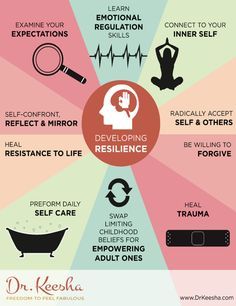
How to Improve Your Emotional Resilience and Wellbeing
Introduction
In today’s fast-paced and stressful world, improving emotional resilience and wellbeing has become more important than ever. Emotional resilience refers to a person’s ability to adapt and bounce back from stressful or challenging situations. It helps to manage emotions effectively, cope with stress, and maintain mental balance.
What is Emotional Resilience?
Emotional resilience is the ability to handle life’s ups and downs, setbacks, and failures with positive and constructive responses. It involves a combination of emotional awareness, self-regulation, optimism, and healthy coping strategies. Developing emotional resilience helps individuals to navigate through obstacles and maintain a sense of well-being.
Steps to Improve Emotional Resilience
1. Cultivate Self-Awareness
Developing self-awareness is the first step towards improving emotional resilience. Take the time to identify and understand your emotions, triggers, and reactions. This self-reflection will enable you to recognize and manage your emotions more effectively.
2. Practice Mindfulness
Mindfulness involves being fully present in the moment and accepting it without judgment. Cultivating mindfulness through activities such as meditation, deep breathing exercises, or yoga can significantly improve your emotional resilience. Mindfulness helps you develop a calm and focused mindset, enabling you to deal with adversity more effectively.
3. Build Strong Support Networks
Surrounding yourself with supportive and positive individuals can greatly enhance your emotional resilience. Build strong connections with friends, family, or support groups who provide understanding, encouragement, and a safe space to express your emotions. Talking about your concerns and seeking social support can help you navigate through difficult times.
4. Develop Healthy Coping Mechanisms
Engage in activities that help you relax and recharge. This may include exercise, hobbies, spending time in nature, or practicing self-care. Engaging in regular physical activity has been shown to reduce stress, improve mood, and enhance overall well-being. Find healthy outlets for stress and emotions, such as journaling, painting, or playing an instrument.
5. Practice Emotional Regulation
Being able to regulate and manage your emotions is crucial for emotional resilience. Practice identifying and labeling your emotions accurately. Explore different techniques like deep breathing, visualization, or taking a short break to calm down when you feel overwhelmed. By learning to regulate your emotions, you can respond to challenges in a way that supports your well-being.
6. Foster a Positive Mindset
Developing a positive mindset is key to improving emotional resilience. Focus on your strengths, achievements, and lessons learned from past experiences. Challenge negative thoughts with positive affirmations and gratitude. Cultivate optimism and a growth mindset, where setbacks are viewed as opportunities for growth rather than failures.
7. Seek Professional Help if Needed
If you are struggling with emotional resilience despite your efforts, it is crucial to seek professional help. A therapist or counselor can provide guidance, support, and strategies tailored to your individual needs. They can help you navigate through challenging situations and develop a stronger emotional foundation.
Conclusion
Improving emotional resilience and well-being is a lifelong journey that requires consistent effort and self-reflection. By cultivating self-awareness, practicing mindfulness, building strong support networks, developing healthy coping mechanisms, practicing emotional regulation, fostering a positive mindset, and seeking professional help if needed, you can significantly enhance your emotional resilience and overall well-being. Remember, emotional resilience is a skill that can be developed and strengthened over time, leading to a happier and more fulfilling life.

